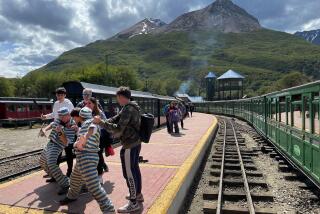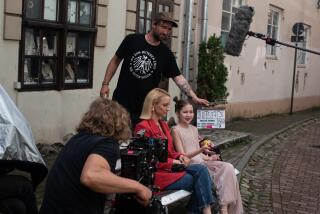Retro Tour in Latvia Comes With a Night in Soviet Jail
- Share via
LIEPAJA, Latvia — After the ill-tempered guard clanged the cell door shut, the darkness was enveloping and complete. Then lights flashed and a voice barked: “Face the wall! Hands behind your back!”
In the room, under pictures of Lenin and Stalin, a stern-faced Soviet army officer sat hunched over a desk, smoking. “What are you doing in a restricted military zone?” he demanded.
So began an unusual Latvian exercise in retro-chic: a night in a Soviet-era slammer.
Each weekend, about 25 people pay 5 Lats ($9.20) to spend the night being bullied and interrogated in a prison haunted by Latvia’s 20th-century miseries. Real and fake mix together in grisly harmony: Visitors witness the reenactment of a prisoner being shot after his third escape attempt and visit the mass grave of 160 real inmates nearby.
Those inmates were shot during the 1941 to 1944 German occupation of Latvia. Then came the Soviet reoccupation, which ended in 1991. Now comes the nostalgia as this Baltic democracy of 2.3 million people moves further from its painful past.
Tourists and locals alike can experience it in the prison at the Karosta, or “war port,” in the coastal city of Liepaja.
Built originally as a military hospital in 1903, the red-brick building was converted into a prison two years later and used until 1997.
The prison sat empty until 2002, when a group of Liepaja residents led by tourism agent Liga Engelmane formed the Partnership to Save Karosta, whose well-chosen Latvian initials are KGB, and offered interactive tours.
“Inmates” can pay $3.70 for a 90-minute daytime tour that includes being locked in a cell and a trip to the infirmary, or buy the $9.20 package billed as an “extreme night.”
Extreme nights are not for the fainthearted. The cubicles are damp and the “extreme toilet” is four holes in the floor. Visitors do calisthenics to stay warm and sleep on planks with fleas for company.
Those who disobey orders may be sent to solitary confinement. “You are exiting Hell,” says an inscription above the door, written by a real-life inmate long ago.
Liepaja, like many Latvian cities, is losing many vestiges of its Soviet past as it becomes more Westernized. Sunbathers cover Liepaja’s white-sand beaches where Soviet tanks were once stationed with their guns pointed toward a possible Baltic Sea invasion.
Even Karosta, for five decades a restricted military zone, now has an artists’ commune occupying a former military headquarters and an art gallery.
So why go through all this when you can lie on Liepaja’s sandy beaches or enjoy the nearby art display?
“It allows you to return to the past and to see how it was really done,” said Martins Jaungailis, 20, a college student from Riga, the capital.
Jaunus Tammeaed, 39, came from neighboring Estonia with vacationing employees of the AGA industrial gas company. He said the experience brought back memories of his Soviet army service in the 1980s.
“I don’t feel threatened, so it’s not so realistic in that way,” Tammeaed said. “But it’s a good idea for anyone who hasn’t lived through those times.”
Gunta Insberga, the gas company’s Latvian representative who arranged the tour, said that the group wanted to do something other than visit art exhibitions, attend concerts and sit around in bars.
“Sometimes it’s more interesting in a pile of dung,” she said, laughing. “We thought this would be a good way to end our trip.
“I had never slept on a wooden plank before,” she said. “Everyone is going to remember this for the longest time.”
KGB’s Engelmane said the idea was to save a bit of history for future generations.
“The Soviet era was painful for us,” she said, “but we want to retain a part of it because there is already an entire generation in Latvia that has not grown up in the Soviet system.”
She said she had heard no criticism of the tours.
In fact, former prisoners have walked KGB staff around the prison, handing out tips on how to make the experience more authentic.
The tour revenue pays for salaries and has raised more than $5,500 for badly needed renovations, Engelmane said. Business is good, she added; every “extreme night” this summer has been fully booked.
More to Read
Sign up for The Wild
We’ll help you find the best places to hike, bike and run, as well as the perfect silent spots for meditation and yoga.
You may occasionally receive promotional content from the Los Angeles Times.






